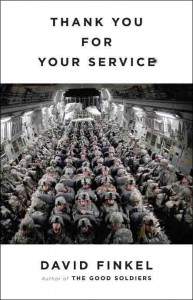Thank You For Your Service
David Finkel, Scribe, 2013, 256 pp,
ISBN 978-1-922247-08-7
David Finkel, author of the New York Times bestselling book The Good Soldiers – a journalistic account of the lives of the men from the 2-16 infantry battalion on the front lines of Baghdad, emerges once again with a gripping addition to his work – Thank You for Your Service. This new book takes a look into the lives of soldiers who serve in Iraq, this time with a glimpse into what happens when they return home.
In Thank You for Your Service, Finkel meets with men from 2-16 to look at the way the war has affected their lives outside the battlefield. First person accounts of adjusting to life outside Iraq throw light on a new war fought by many soldiers, this time with themselves.
The wars of the 21st century have been well covered by journalists, reporters and authors from across the world, but none like Finkel. He presents a harrowing account of the psychological state of many of our modern war veterans.
The book begins with an introduction to Adam Schumann – “the great soldier who one day walked in the aid station and went through the door marked COMBAT STRESS and asked for help”. After making the difficult decision to return home, Schumann is plagued by nightmares, flashbacks, memory loss and crippling depression. Other veterans featured include Tausolo Aieti, who forever sees the image of his fallen comrade in his dreams asking the question “why didn’t you save me?”; and widow Amanda Dorster as she struggles to comprehend life without her husband.
The book presents an in-depth analysis of the psychological condition of war veterans from first person accounts and psychological analysis from professionals. The most common conditions suffered by those returning from the battlefield are post-traumatic stress disorder (PTSD) and traumatic brain injury (TBI). While many people have heard of these conditions, not much is actually known about them. Finkel uses soldiers’ own accounts to put them into perspective.
PTSD is the psychological damage caused by experiencing traumatic events, such as those experienced by Schumann, who carried a wounded comrade down a flight of stairs, with blood from the man’s head wound pouring into his mouth – a taste and smell he cannot shake. Symptoms of PTSD can include depression, flashbacks, nightmares and anxiety. While TBI stems from physical brain trauma, such as that experienced by Aieti, who was in a Humvee travelling down a route lined with palm trees, when the vehicle rolled over three buried 130 mm artillery shells “everything was right and boom it happened so fast”.
TBI can cause memory loss, confusion and impulsivity, and issues with balance, with sufferers struggling to carry out the simplest of tasks.
Many people are unaware of these issues and the extent to which they affect those returning from war. Finkel’s research shows it is a much graver issue than many expect, with PTSD affecting 20-30 per cent of US soldiers deployed to Iraq and Afghanistan.
The intimate encounters relayed in the book give a clear and frightening portrayal of the long-term effect of being in a warzone, the terrifying psychological state of veterans and the stigma surrounding psychological illness. The book relays diary entries, conversations, court cases, and tales of abuse and suicide, exploring in detail the far-reaching effects of war as it leaks into the homes of the veterans.
For the soldiers and their families, the journey to recovery is tough. Many soldiers are faced with the realisation that society is far less understanding of psychological illness than they are of physical conditions. Widow Amanda Dorster was given US$100,000 dollars in death gratuity, which she refers to “oops money” or “blood money”, while in the Schumann household money has never been tighter since Adam returned from the Iraq.
Finkel follows Schumann’s return home from Iraq, to the time when, years later, he graduates from the Pathway Institute for war veterans, and continues his healing at home with his family.
The book serves as an almost novelistic account, such is the intimacy of the stories and conversations between families, and the emotions expresses by soldiers and their spouses.
Thank You for Your Service is an incredibly thought-provoking and gripping book – the writing methods and use of first person accounts render the text incredibly accessible. I would echo the thoughts expressed in many other reviews of this volume and in urging anyone interested in PTSD and the events of the Iraq war to read Finkel’s work.






